
Description
The University of Pittsburgh’s College of Business Administration has been leveraging Suitable's web and mobile platform to boost co-curricular involvement, scaffold competency development, and foster employer engagement with their students. Chris Meaner, the Director of Career Development, incorporates Student Development Theory as the foundation for the Pitt Business Outside the Classroom Curriculum (PB OCC) to help students succeed from the moment they get to campus until their first destination after graduation.
About the School
The University of Pittsburgh’s College of Business Administration, also referred to as Pitt Business, has approximately 2,200 undergraduate students enrolled across 8 majors. Located in the heart of Oakland and a short drive away from downtown Pittsburgh, the Pitt Business motto rings true: “We take students from the classroom, to the city, to the world.” According to the U.S. News & World Report’s 2022-23 Undergraduate Business Program Ranking, Pitt Business was ranked 23rd among public universities. Previously in 2022, Poets&Quants ranked the program No. 10 overall among public undergraduate programs – its highest-ever place in this ranking.
Before Suitable: Understanding Student Development Theory
Before diving into how Pitt Business uses Suitable to succeed, it is important to understand the fundamentals of Student Development Theory that the PB OCC relies on. Student Development Theory refers to the several schools of thought that explain how college students develop and learn. There are four core principles of Student Development Theory: describe, explain, predict and control. Altogether, these principles create a common language that enhances program planning and assists advisors with meeting students where they are. The end goal is for higher education professionals to produce specific developmental outcomes through control, not just descriptions and explanations.
On top of these core principles, there are the three different types of Student Development Theory: psychosocial, cognitive and typology. The PB OCC is grounded in Alexander Astin’s Involvement theory, which falls under the typology category. Astin’s theory highlights how students must be engaged in order for growth and learning to occur with a specific emphasis on the proportional correlation between the amount of student learning and personal development to the quantity and quality of involvement. Another theory Pitt Business focuses on that does not perfectly fit into a specific type of Student Development Theory is David Kolb’s Learning Styles and Experiential Learning cycle, as shown below.
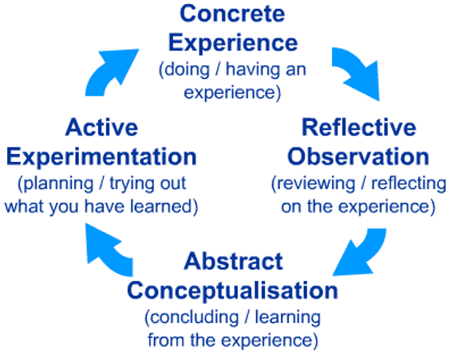
What this theory suggests is that the reflective nature of the PB OCC allows students to identify, in their own words, what they are learning by participating in a given experience. Students are asked to identify how this learning affects their perspective and what they plan to do with this information moving forward.
Life with Suitable
Using Suitable, Pitt Business has boosted co-curricular involvement, scaffolded competency development, and fostered more employer engagement. Both Astin and Kolb’s theories explain why the PB OCC is so impactful, which helps Pitt Business reach students in a way that encourages co-curricular involvement and engagement. The PB OCC on Suitable provides students with a clearly defined pathway of co-curricular experiences that they should complete during their time at Pitt Business. This pathway gives students a way to easily organize their participation into competencies and track their cumulative progress in real-time.
Pitt Business also uses Suitable to implement “Levels'', which is a built-in, customizable assessment rubric. The levels assess proficiency within each of the 10 competencies Pitt Business focuses on. Students progress through the following four levels of proficiency:
- Level 1 - Awareness
- Level 2 - Knowledge
- Level 3 - Skill Development
- Level 4 - Action
The goal is for students to complete each level of the PB OCC. This entails completing at least one activity in every competency at every level – adding up to a total of at least 40 different activities. To incentivize students to complete the PB OCC, students receive a specific prize for completing each level. For example, students who complete Level 1 receive a Pitt Business t-shirt. One of the biggest prizes is awarded when students complete Level 4: a PB OCC graduation stole and recognition at the Honors and Awards Graduation Luncheon!
Pitt Business also encourages the completion of the PB OCC by leaning into their students’ love for competition. Every week, Pitt Business displays the top ten student point earners across the school’s televisions and social media, so students are gaining recognition on top of the Pitt Business swag.
Not only does Pitt Business provide incentives, but they also introduce the Suitable platform during First-Year Orientation and the First-Year Seminar class. To earn the First-Year Student badge, students must attend class and complete class assignments that are all tracked and submitted through Suitable and integrated into the Pitt Business LMS. An added bonus is that most students who earn the First-Year Student badge simultaneously complete Level 1 of the PB OCC.
Emphasis on first-year students is important. However, about half of the students enrolled at Pitt Business are transfer students. This is a large proportion of Pitt Business, so the school introduced the Transfer Student Experience badge on Suitable. Similar to the First-Year Student badge, transfer students are able to earn their Transfer Student Experience badge by attending and participating in the Transfer Seminar class’ activities.
Every level is composed of Pitt Business' 10 competencies, which were carefully chosen after the Pitt Business team met with their employer partners. During these conversations, employers expressed what competencies Pitt Business students should be bringing to the table for an internship or a full-time job, so every competency is grounded in employer feedback. These competencies are also closely related to the eight NACE competencies but with a different career trajectory lens. To ensure these competencies and the activities within them remain relevant, Pitt Business and their employer partners review them every summer.
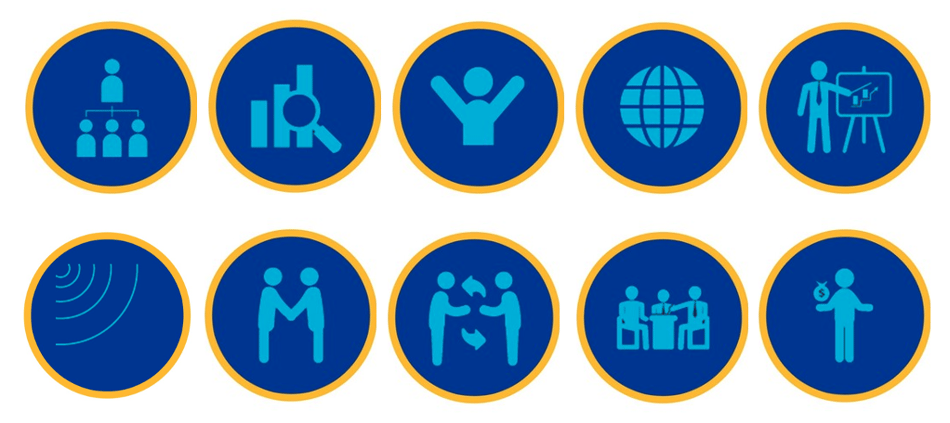
One of the biggest ways students can continue to earn credit toward PB OCC after completing Level 1 is through joining a student organization. About 70% of Pitt Business students are involved in at least one of the 28 Pitt Business student organizations. Through Suitable, these student organizations are able to register co-curricular activities of specific levels and competencies on the PB OCC. This procedure allows student organizations and on a greater level, Pitt Business, to track everything the students are doing. Again, leaning into Pitt Business students’ love for competition, there is also a PB OCC student organization competition conducted through Suitable’s group leaderboard. As individual students earn points, their points contribute directly to their student organization’s score. In the end, the top scoring Pitt Business student organization receives additional funding to put toward future events.
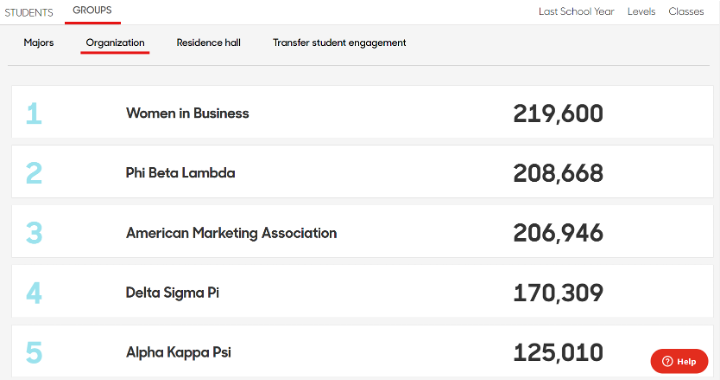
Finally, and perhaps the most enticing reasons students stay involved with the PB OCC, is the robust employer partner program. Depending on the employer’s level of engagement with Pitt Business, the company has the ability to create a profile on Suitable, connect with Pitt Business students at career fairs and add events directly into the PB OCC. Not only are employers invited to share what competencies students need for the workforce, but they also can provide guidance on curriculum development.
For employers who are part of the higher levels of the partner program, they have the opportunity to create employer-specific badges in Suitable. To create a badge, recruiters can easily select from different activities and events that relate to specific competencies that the employer wants students to participate in. Through Suitable, employers can then easily pull reports on which students completed their badge and decide whether or not to invite those students to apply for upcoming jobs and internships. Not only do students benefit from employer badges, but employers themselves gain additional recognition and awareness of their company’s brand because every time students log into the Suitable platform, the employer badges are always front and center.
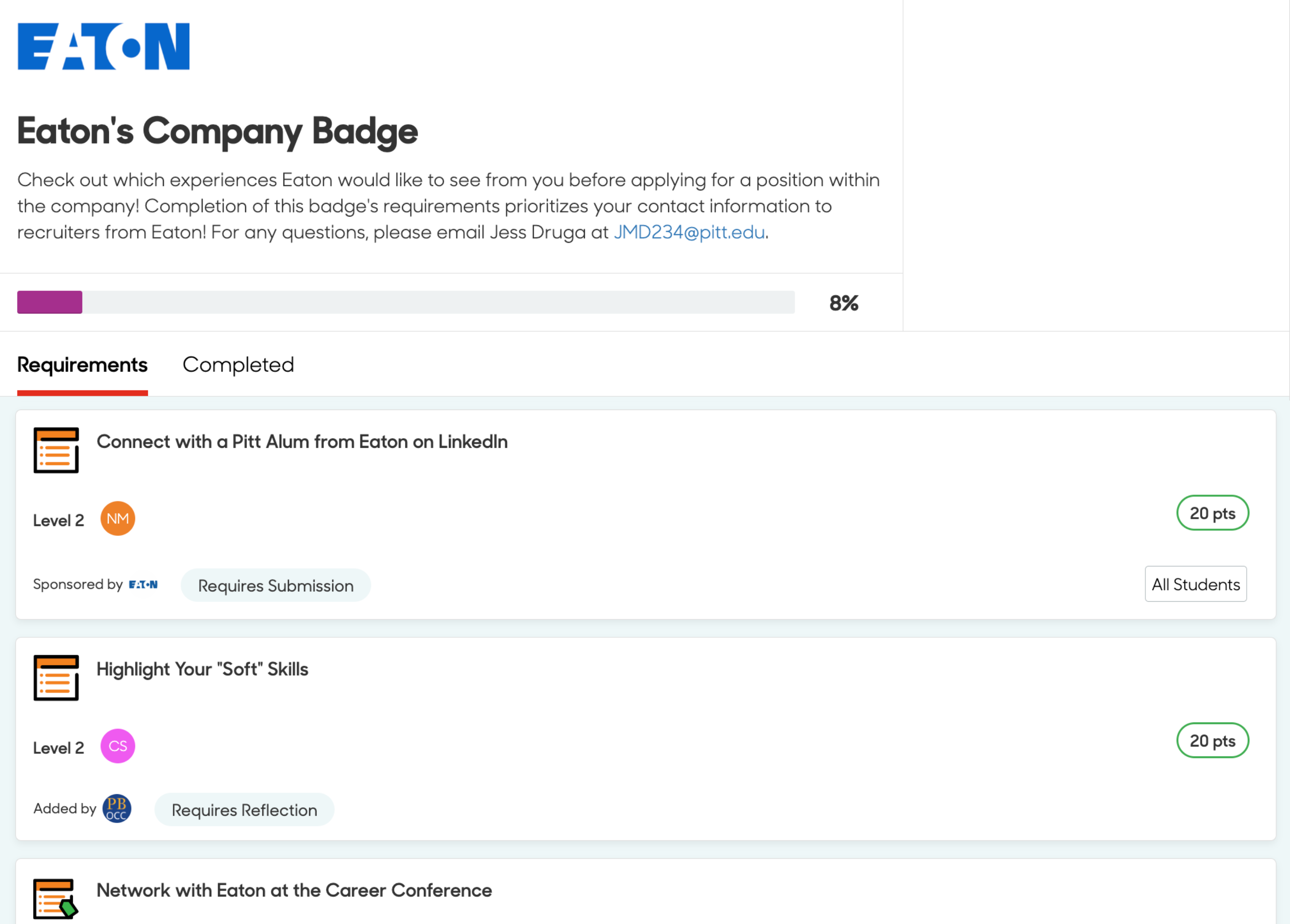
ASK THE ADMINISTRATOR
"The PB OCC gives students a roadmap of how they should be engaging with us. We have a really complex series of offerings that we offer on a daily basis and Suitable takes the guesswork out of that for our students."
Chris Meaner
Director of Career Development, University of Pittsburgh's College of Business Administration
Take a look at the accomplishments of the Pitt Business OCC
- 95% first-year student retention rate
- 97% knowledge rate of seniors post-graduation plans
- 60% study abroad rate
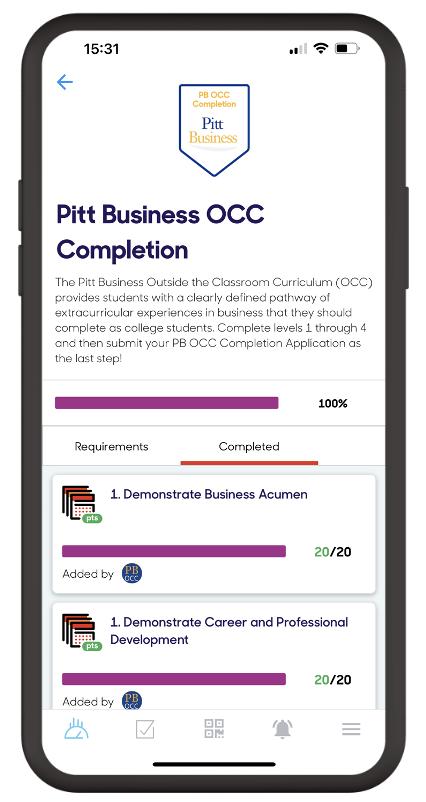
Additional Outcomes Achieved
Despite being optional, Pitt Business has been able to achieve about an 80% adoption rate of Suitable within their student body. The PB OCC is a huge part of Pitt Business’ equation to success. Through data analysis on Suitable, Pitt Business understands that the combination of joining student organizations, attending career development events and appointments, as well as participating in internships lead students to a job after graduation. With the help of Suitable, Pitt Business discovered the biggest indicator of student success is the student’s involvement in student organizations. This is why Pitt Business collaborates heavily with its student organizations, as this is the most accessible way to reach students.
Plans for the Future
From increased student engagement to increased student retention, Pitt Business has been a successful partner with Suitable for many years. Currently, Pitt Business has 15 partners who participate in the employer badge program. Every year, Pitt Business’ goal is to add five more employer badges. As part of this goal, Pitt Business wants to assess its badges. Pitt Business knows their students are doing them, but the next step is to look at the people who completed the badge and see if they were offered an interview or position.




.png)